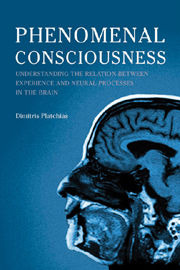Book contents
- Frontmatter
- Contents
- Acknowledgements
- Miscellaneous Frontmatter
- Introduction
- 1 The nature of the mind
- 2 Phenomenal consciousness: the hard problem
- 3 Phenomenal consciousness and the “sufficiency” claim
- 4 Experience and first-order representationalism
- 5 Experience and the explanatory gap
- 6 Experience and higher-order representationalism
- Notes
- Bibliography
- Index
5 - Experience and the explanatory gap
- Frontmatter
- Contents
- Acknowledgements
- Miscellaneous Frontmatter
- Introduction
- 1 The nature of the mind
- 2 Phenomenal consciousness: the hard problem
- 3 Phenomenal consciousness and the “sufficiency” claim
- 4 Experience and first-order representationalism
- 5 Experience and the explanatory gap
- 6 Experience and higher-order representationalism
- Notes
- Bibliography
- Index
Summary
THE STORY SO FAR
We saw in previous chapters that we have good reason to think that qualitative properties can occur unconsciously. There is a large amount of evidence that shows that our unconscious states have effects on behaviour and other mental states independently of whether or not the state is conscious. In Chapter 4, we saw that dispositionalist accounts are highly implausible; first-order states do not become conscious in virtue of a dispositional role these states may have. First-order mental states can occur unconsciously independently of whether they are qualitative or of whether they are suitably disposed or poised to bring about certain higher-order cognitive states. Thus, not only can non-qualitative mental states, such as our beliefs and desires, occur unconsciously, but all manner of perceptions and sensations can exist in both conscious and unconscious modes.
We saw previously that both qualitative and non-qualitative conscious states are experiences in the sense that there is something it is like for one to be in them. Hence, since all manner of qualitative states and properties are not essentially conscious, we have good reason to believe that the same fundamental kind of experience is involved in both qualitative and non-qualitative conscious states. And since the occurrence of such properties is neither necessary nor sufficient for experience, we do not experience our mental states in virtue of the occurrence of such properties. What makes certain mental states such that there is something it is like for one to be in them has nothing to do with whether or not a certain mental state is qualitative. Experience, then, must be specified independently of any qualitative properties and therefore it is explanatorily irrelevant to any qualitative properties.
- Type
- Chapter
- Information
- Phenomenal ConsciousnessUnderstanding the Relation between Neural Processes and Experience, pp. 127 - 146Publisher: Acumen PublishingPrint publication year: 2010

